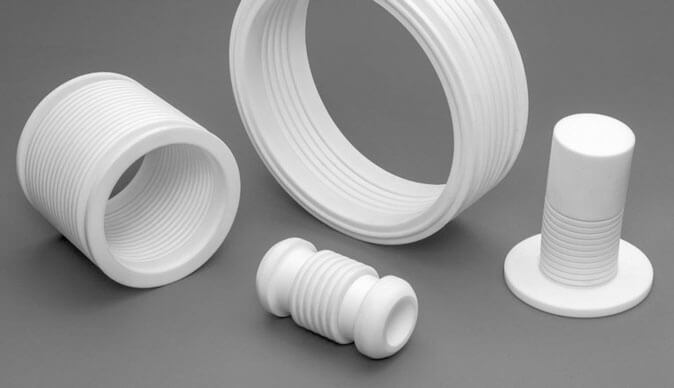PTFE (polytetrafluoroethylene) bellows are flexible, accordion-like structures made from PTFE material. They are used in various industrial applications where flexibility, chemical resistance, and durability are essential. PTFE bellows offer several benefits and have diverse uses across different industries.
Here are some common uses and benefits of PTFE bellows:
Uses of PTFE Bellows:
- Chemical Processing: PTFE bellows are commonly used in the chemical industry to protect sensitive components from corrosive chemicals and to maintain the integrity of seals and connections in pumps, valves, and other equipment. They provide a barrier between corrosive substances and the external environment.
- Pharmaceutical and Biotechnology: In pharmaceutical and biotech manufacturing, PTFE bellows are used to prevent contamination and maintain the sterility of processes and equipment. They are often found in pumps, reactors, and other systems.
- Food and Beverage Industry: PTFE bellows are used in food and beverage processing equipment to prevent contamination and ensure hygiene. They are employed in pumps, mixers, and filling machines.
- Semiconductor Manufacturing: PTFE bellows are used in semiconductor fabrication equipment to protect sensitive electronic components and maintain a clean and controlled environment. They are also used in vacuum systems.
- Aerospace: In the aerospace industry, PTFE bellows are used in various applications, including aircraft fuel systems, hydraulic systems, and instrumentation. Their resistance to chemicals and extreme temperatures makes them valuable in this sector.
- Medical Devices: PTFE bellows are used in medical devices and equipment where chemical resistance, biocompatibility, and durability are critical. They can be found in pumps, chromatography systems, and diagnostic equipment.
- Analytical Instruments: PTFE bellows are used in analytical instruments such as gas chromatographs, mass spectrometers, and spectrophotometers to protect sensitive components from contamination and environmental factors.
- Industrial Machinery: They are used in various industrial machinery and equipment to protect moving parts, such as lead screws and couplings, from dust, dirt, and other contaminants, ensuring smooth operation.
Benefits of PTFE Bellows:
- Chemical Resistance: PTFE is highly resistant to a wide range of chemicals, acids, bases, and solvents, making PTFE bellows suitable for use in corrosive environments.
- Temperature Stability: PTFE has excellent temperature resistance, with the ability to withstand both high and low temperatures without degradation.
- Non-Stick Properties: PTFE is inherently non-stick, which means it resists the adhesion of substances and is easy to clean, making it suitable for applications in which cleanliness and contamination control are crucial.
- Flexibility: PTFE bellows are highly flexible and can accommodate movements, vibrations, and expansions in piping and equipment, reducing the risk of damage or leaks.
- Low Friction: PTFE has a low coefficient of friction, which can reduce wear and extend the life of components in dynamic applications.
- Biocompatibility: PTFE is biocompatible and safe for use in medical and pharmaceutical applications.
- Low Outgassing: PTFE has low outgassing properties, making it suitable for use in vacuum and cleanroom environments.
- Longevity: PTFE bellows are durable and have a long service life, reducing maintenance and replacement costs.
In summary, PTFE bellows are versatile components used in a wide range of industries where chemical resistance, flexibility, and durability are crucial. Their ability to protect sensitive equipment and maintain a clean, controlled environment makes them valuable in applications where contamination control is paramount.


